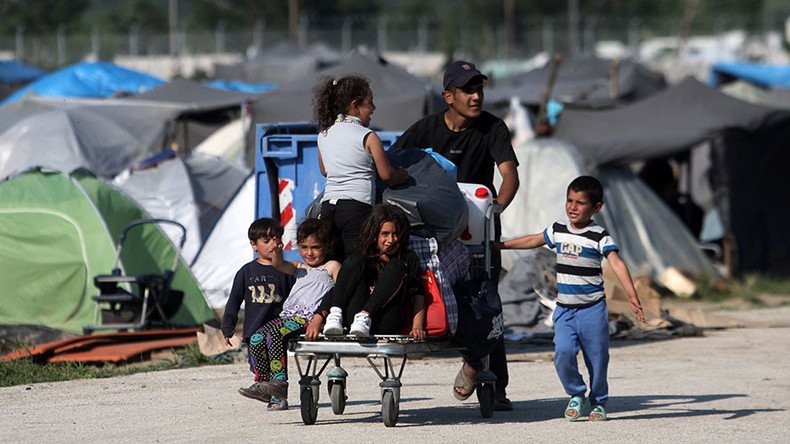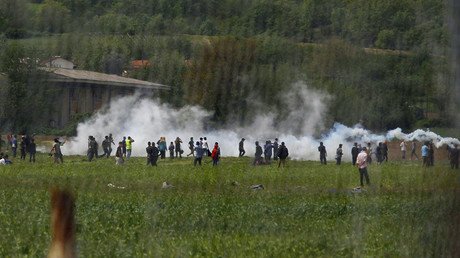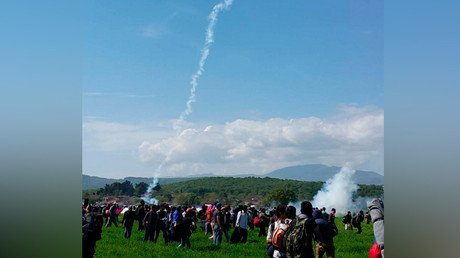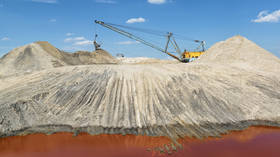Greece to raze Idomeni refugee camp, relocate migrants to ‘hospitality areas’

Greek authorities have launched preparations for dismantling the troublesome Idomeni refugee camp on the border with Macedonia, dubbed the ‘modern Dachau.’ The camp houses over 11,000 asylum seekers who have been stuck there since early March.
“The transfer of refugees trapped at Idomeni to hospitality areas will probably begin [on Tuesday],” the spokesman for the Greek Migration Coordination service, Giorgos Kyritsis, told the state ANA news agency. He added, however, that the plan is to clear the area no sooner than in a week’s time and without the use of force.
“There will be a police presence and we will be persuasive, but we do not foresee pervasive use of force to make all these people leave in one go,” the official said.
Another government source cited by ANA said loudspeakers were already urging Idomeni inhabitants to get ready to leave.
Around a dozen police squads arrived on the camp's periphery from Athens and Thessaloniki, including up to a hundred officers, after having strengthened roadside checks around the camp and setting up two checkpoints. One is some 20 kilometers from the camp, the other is just two kilometers away. A total of some 50 riot police squads are to be deployed to Idomeni, a police source told Reuters news agency, noting that migrants blocking the railway are to be removed first.
A group of refugees has hijacked a train carriage at Idomeni station and attempted to use it to break through the police barricade in April, with refugees often blocking the tracks for the passing trains ever since.
“The rail track will open for the train to pass through normally but the fundamental thing is for the people to be transferred to where the conditions are humane,” Kyritsis said.
“A thing like Idomeni cannot be maintained. It only serves the interests of smugglers,” he added.
Kyritsis notes that inhabitants of Idomeni will mostly be moved to camps at former industrial facilities as some 6,000 temporary housing places have been created for this purpose in Thessaloniki area. “Removing all the refugees from the disgrace which is Idomeni is in their own interest,” the official told state TV on Monday.
Some 400 people have already agreed to leave the camp since Sunday, while 400 more are expected to follow them on Monday night, according to local police.
The Greek government already attempted to empty Idomeni several times in the past months, amid growing discontent from farmers in the region, tensions with neighboring Macedonia over the control of border-passages and repeated clashes between camp inhabitants and police. In April, after an attempt to break through the fence, some 260 refugees were injured when Macedonian police used tear gas to stop the mob from crossing the border. Medics at the scene claimed officers also fired rubber bullets at the refugees, but Macedonian authorities denied the allegations.
READ MORE: Outraged Greek farmer plows tractor through refugee camp (VIDEO)
Humanitarian organizations have been speaking out over poor living conditions at Idomeni, which threaten the health and safety of the people stuck there. The camp has even been described as a “modern Dachau” by Greek Interior Minister Panagiotis Kouroumplis, who compared it with the infamous Nazi concentration camp.
Europe continues to face the biggest refugee crisis since World War II, with over a million migrants arriving last year.
READ MORE: ‘Modern Dachau’: Greek minister slams conditions at Idomeni refugee camp
Many refugees come from Syria, where a civil war has killed 250,000 people and displaced more than 12 million since 2011, according to UN figures. The European Union struck a deal with Turkey in March, under which illegal migrants reaching Greece from Turkey are to be returned. With the Balkan route closed in March, the number of migrants arriving on the Greek islands in April dropped by 90 percent compared to the previous month, according to Frontex, the EU’s border agency, which monitors the refugee flows. Still, it states that up to 50,000 refugees remain stranded in the north of the country, with fewer than 500 people sent back to Turkey since March 20.















